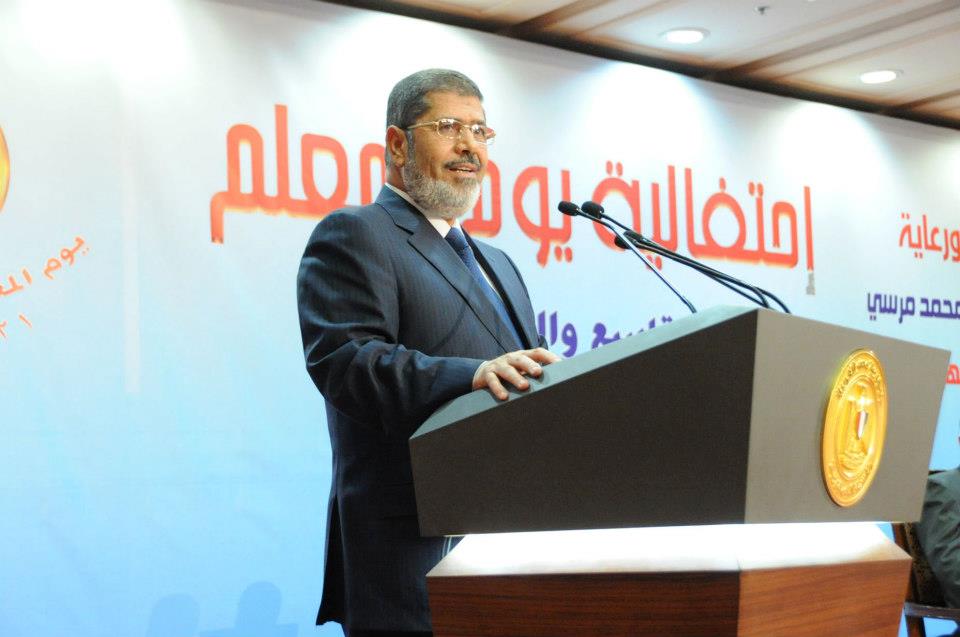
“There is no room for confrontations or mistrust.” This sentence, delivered by president-elect Mohamed Morsi on June 24, 2012 was part of his first speech to the Egyptian people amid a section stressing the importance of “national unity.”
Trust was a critical point to highlight moving forward after a contentious election when accusations were lodged against different campaigns and the people elected a member of the Muslim Brotherhood, a group that a significant part of the population deemed untrustworthy.
He was keen on promoting the beginning of a new Egypt with strong and reliable institutions, specifically saluting the judiciary. “The judiciary…should remain separate from executive authority. This is my responsibility in the future to keep the judges independent from the executive and legislative authorities.”
In his famous address in Tahrir Square four days later, dramatically opening his jacket to the crowd to show he did not fear his people, he again focused on the concept of national unity. “I tell you, the great Egyptian people, those who elected me and those who didn’t – I am for you all standing at the same distance. This is democracy.”
Before listing his young administration’s accomplishments during his October 6th Cairo Stadium address, he told those attending, “I shoulder the full responsibility for ending the problems of the public as I have promised.”
Morsi’s November constitutional declaration was a turning point. The sudden and dramatic increase in control that the president took over the country’s democratic transition accelerated a political rift that was already beginning to burst at the seams and irrevocably polarized and crippled any dialogue that existed.
Morsi delivered a speech at the presidential palace on Friday November 23, in the presence of only members of the Muslim Brotherhood and his supporters, while demonstrations against the decree took place across the city in Tahrir Square. In that speech, the president argued that his newly gained powers, which guaranteed full protection to the Constituent Assembly, would only be used when his homeland was threatened with danger “by the former regime.” He also said he would not allow anyone to act “under the cloak of the judiciary.”
Internal strife intensified in December when members of the Muslim Brotherhood attacked a sit-in at the presidential palace, culminating in a street battle between two sides. Blood reached the doorstep of the president, largely due to a decision made by the Brotherhood, and Morsi was handed yet another opportunity to genuinely promote national unity.
Instead he blamed the tragic events as falling under the guise of a political dispute that could have “been solved through dialogue and consensus”- two things he forwent when issuing his declaration that divided the country.
During his speech, he directly referred to the former regime four times and blamed his opposition for inciting violence. He also claimed that the prosecution had interrogated detainees and found that they worked with some political powers, a claim that proved baseless when those detainees were released. He said he was working for “all Egyptians,” something he stated repeatedly on other occasions. However, given the larger context of his speech it was clear that the president had chosen sides and decided to paint criticism of him as largely motivated by the deposed Mubarak regime.
A month and a half later when violence broke out first in Port Said, followed by Cairo, and other cities, the president used his January 27th address to pressure his opposition into participating in national dialogue without making concessions. He called clashes “sinful attacks” by people while patriarchally wagging his finger at the nation while imposing emergency law on canal cities.
Last Friday, when faced with another manifestation of political polarization on the streets of Moqattam, Morsi pointed to the media and foreign elements for attempting to divide the Egyptian people, promising dire consequences.
Later in the week, he proclaimed that he would cut off any foreign finger that attempted to meddle in the country’s internal affairs.
The president has clearly taken on a tone of antagonism when met with internal challenges. Rather than speak to the Egyptians whom he claims he represents, he has elected to face critical junctures with hostility. He has repeatedly insinuated that he knows the sources of unrest while taking no serious steps to address them.
It’s easy for a government to blame the media, foreign elements, and the former regime. However neither the media, foreign ‘elements’, or the former regime can be blamed for a constitutional declaration giving the president sweeping powers, for failing to reform a virtually unchanged security apparatus, or failing to seriously seek input from opposition or even advisors who have since resigned.
His message has changed from one of unity to aggressive assertions in the name of protecting the revolution. His speeches do not reflect a country experiencing internal struggle, but a fantasized one unified against an 84 year old former dictator in a prison hospital and unnamed external forces allegedly armed with molotov cocktails, attacking party offices, and torturing detained activists.
The opposition has failed to make effective decisions at critical junctures. However, the popularly elected president and self-proclaimed “president for all Egyptians” is the most powerful person in Egypt, and he has proven it. A leader who wants to address his people must come from a place of understanding the multiple sides to the political complexities that face the country. Instead, he has used the podium that comes with it to exacerbate the confrontations and mistrust for which he asserted there was no room nine long months ago.
Basil El-Dabh is a reporter for Daily News Egypt. He graduated from Georgetown University with a Bachelor of Arts degree in Political Economy.
Image: Mohamed%20Morsi%20.jpg
